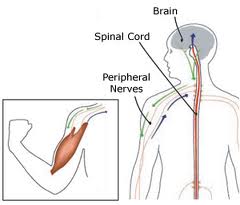Muscles can be sore for a number of different reasons. Soreness can be a result of a muscle tear or a joint injury, or it could come from being overworked or overstretched. Whilst it might feel natural to stretch your stiff neck or your sore hamstring, is it a good idea?
In one word…
No
Despite how tempting it is to ‘stretch the soreness out’, it is often not a good idea, nor is it likely to work.
What are sore muscles really telling us?
Muscles alone can’t tell you that they’re stiff and sore because, on their own, they are really just pieces of meat. Your nervous system (nerves and brain) on the other hand is responsible for
- telling a muscle to shorten and lengthen, and
- telling you whether your muscle feels stiff or sore when doing so
It is also your nervous system’s job to protect your body from damage as a result of injury. If a muscle feels stiff and sore, it is likely that your nervous system has concluded that stretching the muscle might aggravate or cause damage. In other words, the pain and stiffness are essentially protective mechanisms.
Will stretching a sore muscle cause damage?
Not necessarily, but it may lead to more pain. There are endless possibilities as to why the brain might be concerned about a muscle stretching. It could be that:
- there is damage in the muscle, like a tear, that will be aggravated by stretching
- the muscle is fine, but is tense because it is protecting a nearby joint
- the muscle is tight to prevent the body from moving in certain ways that are not familiar or comfortable
So whilst stretching the muscle might not necessarily cause more damage, it may heighten the perception of threat which is likely to cause more pain and stiffness in the muscle.
So what should I do about stiff or sore muscles?
- Don’t automatically stretch them – whilst certain forms of stretching for some muscles can be beneficial, it is probably not your best option
- Continue moving in a gentle and pain-free way, avoiding movements that cause tension, stress or discomfort – doing so can help provide the brain with positive input and reduce the perceived threat associated with movement.
- See an expert! A good physio can do a thorough assessment to help identify possible causes of the muscle soreness and get you on track for a safe and speedy recovery.
Recommended reading from Glow
3 signs your neck is giving you headaches
5 habits for a happy, healthy spine!
5 simple exercises to kick-start your day!

